#Hilary Mantel is right
Text
I brought Hilary Mantel's A Place of Greater Safety with me to school because I don't have anything to do in the staffroom and thought I could make a start on it... And I've finally experienced fear at a book - I wasn't fussed by the size, and the French Revolution is an interesting period to read about, but the length of the cast of characters is just...WHAT?! I don't think I have the brain capacity for this!
Luckily I brought Ovid too, so back to that (I should probably finish Ovid anyway)
#books#reading#hilary mantel#a place of greater safety#i will read it#I'm excited for it!#but not right now
5 notes
·
View notes
Link
The Saudi response to The Satanic Verses has been low-key; the Ayatollah, who refers contemptuously to their faith as ‘American Islam’, has stolen their thunder. But it is not difficult to imagine the depth of outrage. The first popular reaction in the West to the death threat was, I think, amazement, tinged by what came near to a disbelieving hilarity: ‘But it’s only a novel.’ We could not believe that people would riot about a story.
Novelists have various tricks for concealing what they are about. If they want to use a real person as a character they can, if competent, cover their tracks well enough to avoid being sued for libel. If critics call their work ‘brutal’ or ‘offensive’ they can smirk and say that they were spinning a metaphor, forging a conceit, creating an allegory. They can, like Salman Rushdie, allow their characters to dream. Writers no longer talk about their muse, but they are willing to talk about how their characters take over, about how the author himself is a minor part of the process, carried along on some irresistible creative tide. It is all part of the mystique; authors enjoy it. In the West, it does not matter whether they slide away from the implications of their work in this way.
Elsewhere, of course – in the Eastern bloc or in South Africa – a novel is taken perfectly seriously as a vehicle for ideas. Its writer is forced to stand behind the points he makes, and is given no particular privilege. The censor will peel the novel’s defences away and say, so this is what you really meant; and penalise and punish the author accordingly. But elsewhere the censor may not bother to strip away the conventions; he may not even recognise that they exist. Art for art’s sake will mean nothing to him. The Satanic Verses may be a great work of art, the pattern on the floor tiles may have been aesthetically pleasing: but both are political acts. The defences of merit and of good intention that we are accustomed to erect around a persecuted work of art cannot help Rushdie’s book, in countries where they are not recognised as defences. In Tehran, malice is understood. It is taken for granted. There is a world-wide conspiracy against Islam, and Rushdie is its ‘mercenary’.
If his defence cannot be made in artistic terms, it must be made in political terms, but it is hard to feel pleased with the politicians. When the British Government says that it understands that Muslims are offended by the book, it means it understands that offence has been taken. It is not near to understanding the nature of the offence. The Prime Minister says that great religions should be strong enough to withstand criticism, and her remark is alarming because it is so wide of the point. Unlike modern Christianity, Islam does not make a virtue of tolerance. In theory it accommodates the faith of Christians and Jews, the ‘people of the book’, but the Kingdom, at least, does not permit any form of worship other than the Islamic; projecting their own intolerance on the outside world, the faithful in Jeddah found it hard to imagine that in Britain their co-religionists could go freely to a mosque, and they only half-believed it. If you are in Britain, Islam appears an inward-looking and self-protective faith, but when you are in the East it appears vital, active and proselytising. Not long ago, the same could be said of Christianity. Unless we are prepared to think about our own history, enter into it a little, we cannot know what the Muslim writer is talking about when he speaks of ‘spiritual torment and torture’. The silly and the secular do not understand the God-driven. Fundamentalists look at our cheerful modern notion of live-and-let-live, and find it immoral and incomprehensible.
In the first few days after Iran issued the death threat, the support for Salman Rushdie was heartening and unanimous. But we are so used to intellectual consensus and compromise that when we meet an intransigent opponent, with whom no meeting of minds seems possible, we immediately doubt our own case and our own values: politeness may be the ruin of the West. The backtracking has been an unpleasant spectacle. It was unpleasant to hear a young Tory MP say recently that ‘two or three’ of his friends had told him that the book was ‘very second-rate’, and announce that since Rushdie had made so much money he should pay for his own police guard: we do not expect our legislators to be able to read, but we do expect them to be able to distinguish between a private man’s private difficulty and a matter of vital public interest. And just as unpleasant is the defection of those who now cast doubt on Rushdie’s integrity, or urge withdrawal of the book. Perhaps it is understandable that the authors of children’s books and light social comedies should decline to defend The Satanic Verses. Their freedom of expression is not at issue.
#what I'm reading#hilary mantel#salman rushdie#the satanic verses#free speech#I read 'mantel pieces' right after her passing and this essay was one of the pieces included#I thought it was very well-reasoned and sadly quite relevant#the rest of it isn't much longer than this excerpt and worth reading in full
9 notes
·
View notes
Text
A List of Relatable Things Stanisława Przybyszewska has done/written:
Studied philosophy at a university for one semester until "nervous exhaustion forced her to abandon her course"
Dated her letters by the French Revolutionary Calendar
Was known to often be humming La Marseillaise
Called Camille a twink in her play (okay, to be fair she used the word 'ephebe', but I'd argue that is as close to twink as you can get in the 1920s)
Worked at a leftist bookstore (and was subsequently arrested for it)
Took a stray cat from the street which at one point "was the only creature keeping her company"
Complained in at least two letters spanning over 3 paragraphs about a group of loud people playing football near her windows ("For the past forty-five minutes they have not been roaring, they have not been howling, they have been simply shrieking (...) like animals being slaughtered. Screams of that sort must be frightfully tiring for the vocal chords.")
When she wrote "I must write in order to be able to think. As a matter of fact, I am a remarkably unthinking person. Well, of course, that holds true too when I'm talking. But if I don't have either paper, or a human ear to listen to me, then I'm no more of a philosopher than a cat is."
1 + 8 - since I study philosophy at uni & am currently working on my thesis, these felt particularly relatable. I'm not more of a philosopher than a cat is definitely hits. Kind of want to put it in the preface.
2 + 3 are things I may have done myself before (okay, not letters but a diary, but it counts, right?)
7 - as someone who struggles with misophonia, I felt s e e n.
4- I'm sorry guys, I had to. But as someone who frequently asks herself "Are you really calling 30-somethings who have been dead for more than 200 hundred years twinks?", this felt like a vindication of sorts.
Also- I feel kind of conflicted about making this types of Tumblr posts about her since her work is really profound and serious and I have a sneaking suspicion she would have not appreciate them. At the same time, she has been living in my mind rent-free for the past week and this is a way to cope I guess?
SOURCES:
1. A LIFE OF SOLITUDE: STANISŁAWA PRZYBYSZEWSKA
Author(s): JADWIGA KOSICKA and DANIEL C. GEROULD
Source: The Polish Review , 1984, Vol. 29, No. 1/2 (1984), pp. 47-69
2. BBC Reith Lecture Three: Silence Grips the Town. Dame Hilary Mantel, 2017
3. Stanisława Przybyszewska: A Brilliant Playwright Preoccupied With Revolution. Alexis Angulo. Retrieved from: https://culture.pl/en/article/stanislawa-przybyszewska-a-brilliant-playwright-preoccupied-with-revolution
4. Przybyszewska, Stanisława. 1930. The Danton Case.
#french revolution#frev#frev community#stanisława przybyszewska#przybyszewska#the danton case#frev memes#history#literature#also go read the articles they are excellent#but obviously incredibly sad#camille desmoulins#20th century literature#misophonia#1700s#maximilien robespierre#georges danton#academia#it actually took effort not to put “daddy issues” on there#I guess it's now in the tags#oops#hall of fame
51 notes
·
View notes
Text
Time for our breather episode, Common Ground
The scenery in this show is so damned good, the way I am instantly in love with Raxus and the gold tones.
Honestly this episode fits much better given what we see in Spoils of War/Ruins of War, emphasizing the humanity of the people in every system. TCW triedddd to do this with the 'heroes on both sides' but they really just kind of said it and then showed us like one lady that didn't suck in the entire show. She died immediately. So I appreciate these episodes.
Also I just love the Senator's droid she's hilarious to me.
Avi Singh is voiced by Alexander Siddig and it made me trust him immediately like all those people in the crowd cheering that is me hearing Julian Bashir's voice come out of this little animated man.
HOW can the scene of them just walking contain so many of my favorite character moments? Omega feeding Wrecker a piece of Mantell Mix, Tech steadying Omega when Hunter helps her off Wrecker's shoulder to make sure she doesn't fall over, her smiling up at him, this expression of UTTER DUBIOUSNESS and SUSPICIOUS SNIFFING from Echo
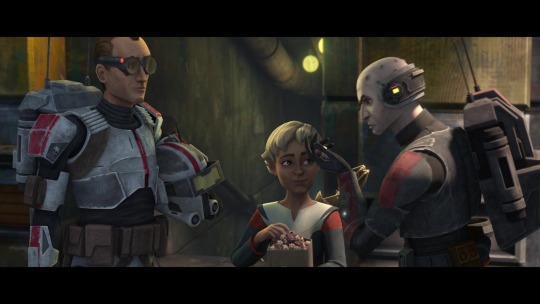
I headcanon that Echo has hella digestive problems after a large portion of them was replaced by technology so every food must pass this sniff test and 90% of them do NOT but especially not whatever sugary concoction goes on this space popcorn.
I do NOT get why people thought for so long that we don't see Tech caring for Omega because every time she stumbles Tech is right there to steady her, he takes such good care of Omega oh my god. Sometimes love is making sure your baby sister never ever falls over!
Which he also does when she gets on a chair and he is right there like JUST IN CASE.

Adolescents often exhibit lack of balance as they grow best to be within two inches of her at all times in case she wobbles.
GRANDMA CRIMES WILL BABYSIT DON'T WORRY ABOUT IT. DON'T TRUST HER BUT SHE'LL TOTALLY DO IT.
I do think it's very funny that the one time Hunter successfully keeps her out of a mission by leaving her on another planet, she immediately becomes central to a gambling ring.
I want a count of how many times Echo complained about this job while Tech is just YOU KNOW WHAT'S GREAT, EARNING MONEY TO EAT WITHOUT PUTTING IT ON CID'S TAB. And Wrecker is just excited to mark off a new system on his Visited Locations list.
"Now are you convinced?" "No >:[" Echo has very valid reasons to not be thrilled about this job but unfortunately separatist doesn't mean much anymore and also they're so cute when they're Grumby.
When you clean SO sadly that Cid comes over like STOP BEING A MOPE. Omega's really leaning into her early teens attitude with SOR-RY.
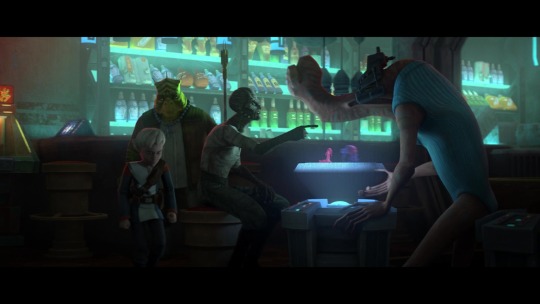
ANGY.
Bolo and Ketch's DISAPPOINTED HEAD SHAKING is so fucking funny. You UPSET the CHILD Cid. Go fix it. Like they weren't taking bets on her fucking up her bow training earlier.
I know Hunter's mentioning Omega is supposed to be Feelsy a little but I do admit it misses a little bit because it's not like she's missing or anything. I do wish they had done something like this with Crosshair early on, like in Rampage when he orders Echo to be eyes in the sky, switch it to him saying Crosshair's name instead and then correcting.
THIS ANTIQUE VASE IS PRICELESS, BE CAREFUL :C I love herrrrrr
You know the senator is in real trouble because they took his hat.
AND BEHOLD! I HAVE SAVED YOUR MOST PRIZED VASE :D
Quite a bit of time is spent on Grand Theft Walker in this episode. Also I'm glad they're using stun bolts but oh boy is it concerning to stun a bunch of clone troopers in the same area where walkers are fighting, this is such a way to get squished.
As always I'm a big fan of Tech getting Punchy I love that he's not at all a docile nerd.
Echo stepping forward to encourage Avi to leave because he can't help his people in custody is sweet but would have been slightly better if we got a little more one on one interaction between the two of them. Even just one solid scene would be good.
I'll give the batch one thing, their success/failure rate is slightly better than I remembered, they are up to 3 successes and only 1 major failure
Frankly they should stop doing merc work though and just let Omega gamble her way through the galaxy.
SHOW A LITTLE GRATITUDE TO MY FRIEND. Cid is officially Affectionate towards this small child.
Another good character moment is Wrecker giving Hunter an EXTREMELY SERIOUS *TALK TO THE CHILD* LOOK
Really the main plot of this episode is a good breather but it really shines in tiny moments that make me Squeal a little. Just those little character interactions that I ADORE.
23 notes
·
View notes
Text
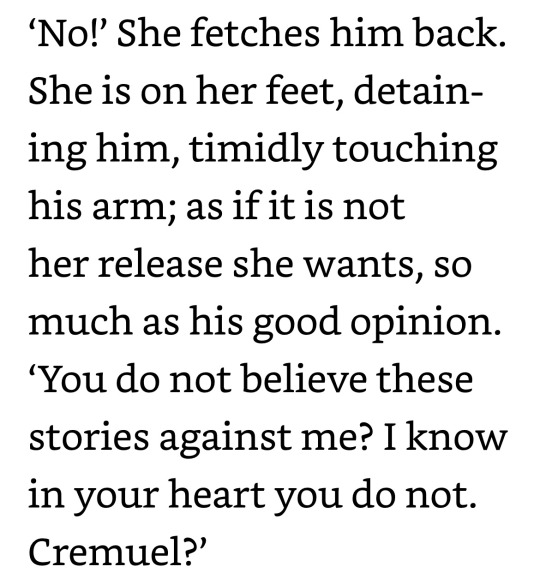


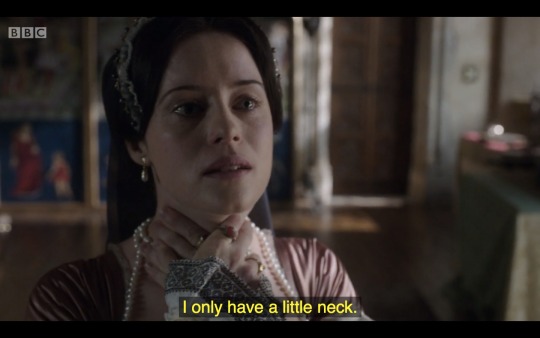
May Hilary Mantel’s Force Ghost forgive me @cinemaocd
Something something a lowborn man with initially sympathetic ambitions ends up becoming a right-hand fixer to a monstrous ruler
21 notes
·
View notes
Text
Sex, Violence and Power in Hilary Mantel’s A Place of Greater Safety
Ever since I finished this book I’ve been thinking about how gendered and sexual violence kind of continually lurk in its subtext and then break into the explicit text in periodic but still-shocking instances of abuse. At first I thought this was mostly unrelated to the central political plot — a matter of historical realism as much as anything — but the more I’ve thought about it the more integral and connected to everything else it seems.
CW: #rape, #abuse, #csa
From the first chapters of the novel, we see that women and girls in this time and place lack the ability to say no to sex with their husbands. As a child, Robespierre hears his maternal grandfather accuse his father of having murdered his mother via repeat pregnancies. Much later, Danton’s wife Gabrielle has a conversation with other women about the impossibility of using birth control in her marriage. Within a year Gabrielle is dead, her death eerily similar to that of Robespierre’s mother.
Manon Roland is molested as a child and carries a fear and revulsion of sexuality with her throughout her life as a result.
And Camille is taken advantage of as a young adult by an older man who controls the future of his career. The fact that Camille’s mentor is sexually predatory seems to be common knowledge throughout the professional community, and instead of intervening to protect Camille they humiliate and ostracize him. When Camille disavows responsibility for the relationship to his father (“None of it was my fault” and “I was just a child”) his father outright scoffs at the idea he might be trying to say he was raped. Much later Danton himself marries a young teenage girl and, again, no one seems willing or quite able to intervene. You get the overwhelming sense that this is a society where sexual abuse and exploitation are treated as mildly unpleasant facts of life about which nothing can or should be done.
Later, Camille narrowly escapes being coerced into sex by Babette, the young daughter of Robespierre’s landlord. Camille’s lingering terror of her after this incident is horribly psychologically realistic, but also…. Babette, teen girl predator of adult men, is the one instance of sexual violence in the book that has never sat entirely right with me.
The real Elisabeth Duplay wrote in her memoirs that Georges Danton tried to kiss her and made inappropriate sexual comments to her when she was a teenager. I see no reason to believe this isn’t true, and in light of it I do think representing Elisabeth as a sexual predator herself is kind of a strange and tasteless choice. It feels like an outlier in Mantel’s otherwise very grounded and realistic portrait of an 18th century rape culture.
The choice to represent a single individual person who lived and died hundreds of years ago as a rapist when she probably wasn’t one itself might leave a slightly bad taste in my mouth, but on the other hand historical fiction as a genre does tend to necessitate casting some dead people in unflattering lights just to create conflict and make the plot run. This alone doesn’t bother me nearly as much as Babette’s later “false rape accusation” against Danton (which is obviously how we’re meant to interpret it in the book, as a lie devised for political expediency) and that accusation being framed as a deciding factor in Robespierre’s decision to condemn Danton to death.
For one thing, this plot beat feels out of step with the development of Robespierre and Danton’s uneasy alliance and rivalry throughout the rest of the novel. From the beginning of the revolution the two of them have a grudging respect for each other but don’t like each other, they don’t share one another’s fundamental values or worldview and those differences increasingly drive a wedge between them as the external pressure on both men mounts. Robespierre becomes more ruthless and paranoid while Danton becomes more violent, exploitative and corrupt. Danton is a sexual abuser by this point in the story. He has married a teenage girl and it’s implied that he’s raping her (by the very implication that she is a child he is having sex with, and by a line in her internal monologue where she hopes he’ll get drunk and fall asleep right away so she won’t have to have sex with him). Meanwhile Robespierre is growing more committed to a belief system wherein “the people” of France are inherently morally pure and if they behave badly it’s because of external bad influences, wherein immorality is a societal cancer that needs to be cut out by chopping off the heads of every Evil Person.
At the end of those two character arcs I would have believed Robespierre was willing to have Danton killed without any false accusation scene, without any out-and-out lies being told to him about Danton. It feels like Mantel didn’t have enough faith in her own story and her own central character arcs and did this weird punch-pulling maneuver at the last minute that weakens the story. Two complex and well-developed characters becoming more entrenched in and committed to their own worst qualities over time until they destroy one another is a strong arc with a strong conclusion. One character being “tricked” into betraying the other by a one-dimensionally villainous minor character is weak and unsatisfying.
Babette and her purely malicious opportunism also makes it feel like… the call is coming from outside the house, so to speak. Like, as Robespierre believes, there are individual Bad People who are the problem and if they could be gotten rid of all societal ills would disappear. But throughout the rest of the story we see that really isn’t the case. Perrin hires Camille out of a desire to take sexual advantage of him, but also treats Camille well enough that years later Camille is willing to risk his own position to save Perrin’s life during the September Massacres. Danton is a loyal friend, a charming and charismatic leader, and someone who likes to compromise and negotiate rather than make enemies. And he’s also an abuser, a sexual predator, and a murderer (especially if you accept Danton’s own judgment that he killed Gabrielle “by unkindness”). When Manon runs into her own rapist years later she observes that he is “a perfectly ordinary young man”.
This is a more compelling and a more true portrait of a culture where exploitation and coercion are baked into the “normal” social structure.
Mirabeau has this internal monologue near the beginning that feels to me like the closest thing APoGS has to a thesis statement:
When you get down to it, he thought, there’s not much difference between politics and sex; it’s all about power. He didn’t suppose he was the first person in the world to make this observation. It’s a question of seduction, and how fast and cheap you can effect it.
So like, we’re all here in politics trying to accrue power. (Even if we hope to use that power for good.) We’re trying to exert as much control as we can over as many people as possible. We’re trying to coerce and manipulate and bribe each other. The methods of the outside world are not alien to the revolution; they are inside it from its genesis and present within it at every step of the way. And much, much later the revolutionary government will collapse into chaos not because of the foreign plots against it that Robespierre imagines but because of internal factional power struggles turning desperate and bloody and murderous.
From Robespierre’s first introduction to the story, we are shown that he has an intertwined horror of sexuality and abuses of power. He understands that his mother’s death was a result of abusive or “excessive” sexual behavior on the part of his father. He understands that as an illegitimately conceived child he would not exist if not for his parents’ immoral sexual excess. He spends the rest of his life trying to distance himself from that legacy and to prove he’s nothing like his father.
Asking himself why he’s so afraid of foreign political conspiracies, Robespierre directly draws the link to his own bodily alienation:
Why, he asked (since he is a reasonable man), does he fear conspiracy where no one else does?
And answered, well, I fear what I have past cause to fear. And these are the conspirators within: the heart that flutters, the head that aches, the gut that won’t digest, and eyes that, increasingly, cannot bear bright sunlight. Behind them is the master conspirator, the occult part of the mind.
Robespierre becomes obsessed with the idea that anyone whose policies he disapproves is a malicious foreign agent, bent on the destruction of the republic. This idea particularly takes root when people whose political views he otherwise shares advocate starting a war. Robespierre cannot accept the possibility that warmongering is an honest miscalculation — that people brought up surrounded by propaganda about glorious military triumphs might sincerely believe war could be a good thing for the republic.
He can’t accept that the violence he abhors is in his allies, that it’s in The People, that it’s in him. He can’t accept that Camille is sullied by sexual deviance, or that Danton could be both a powerful force for political stability and a corrupt, largely amoral bully. Robespierre can’t cope with the murky ambiguity and ambivalence that lurks in the “occult part of the mind”; he can’t bear to think of himself or anyone else he loves as a body capable of sex and violence. So he destroys Camille and destroys Danton and we know that he’ll be killed himself a few months later. I imagine him finally keeling over after slowly and gradually bleeding out from a self-inflicted wound, a self-surgery, a botched organ removal. He tries to excise the impurities from his own life and finds he can’t survive without them. He cannot bring himself to negotiate or make peace with the “conspirator within” and instead destroys himself completely.
36 notes
·
View notes
Text
The Baltimore Orioles Effect
Back when the text-generating neural network GPT-2 was released, OpenAI released it in stages, in part for fear that people might use the more advanced models to generate misinformation.
Now in 2022 we do indeed have people passing off AI-written text as human, but rather than being divisive, it’s mostly used to generate cheap content.
For example, a reader alerted me to a website that posts dozens of new articles every day, on subjects that seem suspiciously wide-ranging for a website called "cookingflavr".
Here's how one of them starts:
Should You Feed Orioles All Summer?
May 2, 2022
Orioles fans should definitely feed their love birds all summer long! Not only will they get some great exercise and some delicious Orioles food, but they will also be keeping an eye on baseball.
and later:
Do Orioles Eat Grape Jelly All Summer Long?
Orioles fans know that the team’s home ballpark, Camden Yards, is located in the heart of the Baltimore metropolitan area. And as summertime quickly approaches, Orioles fans are likely to see a lot of grape jelly on the field.
This appears to be another entertaining case of what I'll call the Baltimore Orioles Effect, in which the text from an internet-trained AI blends two very different concepts with similar names. Whatever is generating this text is mixing up Baltimore Orioles (the baseball team from Baltimore) and Baltimore orioles (the birds known to be attracted to grape jelly feeders) to hilarious effect.
Will Orioles Eat Jelly With Ants In It?
The Orioles are a professional baseball team in Baltimore, Maryland. They are a member of the American League East division. The team has won two pennants and three championships. Jellybeans are a type of food that is often eaten by the Orioles. Ants are also often eaten by the Orioles. The term “jellybeans” and “antoids” are used interchangeably to describe the two types of food.
These are almost certainly AI-generated, questions and all. The browser plugin GPTrueOrFalse pretty well confirms that an AI is generating these - based on how well GPT-2 is able to predict the text in each article, they're coming in at an extremely low 0.02% chance the text is human-written.
Another thing that makes this look AI-generated: the questions do seem to meander off-topic in the manner of an AI that is really only paying attention to the last few things it wrote.
In its article on "What is a Hardanger Fiddle?" the text starts by being extremely wrong about this type of Norwegian fiddle ("The instrument is played with the right hand and is usually played with a tune called The Glenlivet.") but then wanders into talking about fiddles and violins in general (also very incorrectly). There is an entertaining interlude in which it goes off-topic to ask and answer this question:
What Does A Lur Look Like?
A Lur is a small, dark, flatworm that lives in water. They are very versatile creatures and can be found in a variety of different habitats. A Lur is typically a solitary creature, but can form groups of up to six. They have a long body and a short head. The body is covered in small, bumpy scales. The head is small and round. A Lur has a long, slimy tail.
It is somewhat understandable that it brought the trumpetlike traditional Norwegian Lur into the article; less understandable that it's being definitively identified as a flatworm. Maybe it's drawing on fishing-related associations with the word "lure"? This does not bode well for AI interactions with people named Robin or Krystal.
And then there's this, found in the page on What to Hang Over Fireplace Mantel?:
How Do You Hang A Picture Above A Mantle?
How to hang a picture above a mantle:
Preheat the oven to 350 degrees F (175 degrees C).
Spread the picture on a large baking sheet.
Place a rosette on the top of the picture.
Place the picture on a bracket.
Place the picture on the bracket so that the two ends of the bracket are facing the ceiling.
Place the picture on the bracket so that the picture is level with the top of the mantel.
Place the picture on the mantel.
Screw the picture to the mantel.
Bake the picture for 10 to 12 minutes.
Remove the picture from the oven.
Place the picture on a wire rack to cool.
AI-generated advice is terrible, and can even be harmful. One article seems to blend questions about laser pointers and laser eye surgery, which results in some very questionable laser safety recommendations, while another says that rhinos are tasty. This article's advice is also Not To Be Followed:
What Happens When You Reach The End Of Space?
In the event that you reach the end of space, it would be best to stock up on helium, oxygen, and water to survive for a long time. If you don’t have any of those, you can probably survive by eating dust and rocks.
There's also a bunch of blatantly incorrect information on health-related questions and other potentially serious queries, like how to detect gas leaks. At best it's an annoyance when you're looking for real information; at worst it could seriously misinform, especially if another AI-based feature like Google Snippets starts highlighting its answers.
Bonus content: more of my favorite facts from the cookingflavr blog. Do you know Where do frogs live habitat?
#neural networks#fake blogs#baltimore orioles effect#the allure of grape jelly#but not with ants in it
750 notes
·
View notes
Note
Do you have good recommendations of books/movies/ect that either do a particularly good job explaining certain facets of it (you mentioned Early Modern Catholicism recently, which was what got me thinking of this), or simply captures a vibe of the period in a way you think was particularly well-done?
Thanks!
Oooh like late medieval/early modern Catholicism/religious movements of the time (i.e., reformation)?
I think some of my favourites are:
Little Hours (film) - ok, so hear me out. Boccaccio would have LOVED the recent film interpretation of those stories of his (it's stories one and two from the third day, if I remember right. Been a while since I read the Decameron). It's modern in language, music, humour and incredibly pop-modern particularly. Yet the clothes and scenery etc. are all more or less of the late 14th century. Boccaccio, who wrote in the vernacular and enjoyed the bawdy and "common" entertainments of the day, would have been like "yes, you get it. you get what I'm doing" about it.
Just a fun, raunchy story of the late medieval era and it does capture some of the vibes~~.
(Story time: I got into an argument with one of the more curmudgeonly and pedantic historians I know irl and he was so against this movie and I was like "I'm sorry that you're wrong and Boccaccio's ghost is going to laugh at you but it is what it is I guess".)
Wolf Hall (book and show) - while I love the show, I recommend the books over it (for many reasons, not the least of which is: let Thomas Cromwell be fat). That said, if you're pressed for time or can't get into Hilary Mantel's writing style, the show is perfectly good.
She does a great job of capturing England in a state of change and the push pull of the early reformation. Cromwell is obviously of the Protestant persuasion but the dynamic, complicated quality of the average person's engagement with their faith and the Church is more or less captured. It's also just gorgeously written--very lush, you sink into her writing style, quite gorgeous. She also gets her historical details right, so that's a win.
(Unlike the movie Luther which is just like: Luther is always right, the Catholics are always wrong. The end.)
If you're a fan of Thomas More, he doesn't come the best in this, but you know - we are deep in an interior third person of Cromwell's brain so that informs the view of the world we are presented.
(There is a hilarious scene where Cromwell is trying to rally the troops to save More from himself and you get Cromwell, the Duke of Norfolk and a few others kneeling before Henry basically begging for mercy to be shown and it's so fucking funny. Bleak, heart breaking, but also funny.)
A Man for All Seasons (play and film) - and the famous play that Hilary Mantel is in direct conversation with! There's a good movie version of it that I was enamoured with for a time. It's very much a pro-Thomas More piece of writing, so take that for what it's worth. It does suffer a little from the Luther effect of Thomas More always being right and Cromwell and Cranmer and the others always being wrong (or, rather, Luther suffers from the A Man for All Seasons effect). But you know, it's still worth watching I think.
An Instance of the Finger Post (book) - a little later than the other pieces, this is set in the 17th century and is a great who-dunnit from three different perspectives, exploring the classic issue of an unreliable narrator. I remember feeling that it captured life in Oxford just post the Restoration quite well. Also we get some fun cameos from Locke, Boyle and others who were bopping around at that time. Two of the narrators are also known figures from Oxford in the 1660s.
Lent (book) - So, my main man Marsilio Ficino wrote that famous letter to the college of cardinals after Savonarola was executed describing Savonarola as a demon who didn't know he was a demon. Jo Walsh took that concept and ran.
Basically, we follow Savonarola (who is a demon that, at first, didn't realize he was a demon) as he gets stuck in this time loop where he has to keep reliving the last five(ish) years of his life until he manages to free himself from hell. It's like Ground Hog Day but in 15th century Florence.
I have questions around the mechanisms and theological implications of like...his birth, his childhood etc. but you know, don't let that ruin a fun read.
I will say, Lent is a sloooooow start. Like. very slow. I almost set it down and didn't pick it back up at first. It really hits its stride about halfway through. But, it's a fun look at 1480s and 90s Florence with Ficino, Mirandola, Poliziano, Lorenzo de' Medici for a hot minute before he dies etc.
My beef is 1: Piero Soderini, my boy, she did you dirty (tbf to Walsh, the book is from Savonarola's perspective and he and Soderini were not close, shall we say. I may, or may not be, biased); 2: Marsilio is present and we love that but there is no word on Cavalcanti. Not even mentioned in passing!; 3: some of the exposition is heavy handed and could have used some tightening up etc.; 4: Jo Walsh's use of the English for words like Prior etc. which she explains her motive for at the back of the book. I've still got quibbles with that choice, though I know that's a me-thing.
But if you want a novel that is a decent look at every day Catholicism in the early modern period, this is a good one.
Le Moine et la Sorcière (The Sorceress) (film) - a medieval French film from the 1980s that takes place in the 13th century and follows the arrival of a Dominican friar in a small southern French town investigating rumours of a sorceress. It's a delightfully weird piece that plays with the story of St. Guinefort (the dog saint!) as well as medieval faith healing and other local synchronistic practices that carried over from pre-Christianized France.
The whole exploration of local sainthood, where a figure is not formally determined to be a saint by the Church but local people venerate them and eventually they sort of are absorbed into the canon, is fantastic.
The friar, Etienne, is wonderfully drawn as a character. I do wish they had given the same treatment to Elda, the titular "sorceress". But it's still worth a watch if you can get your hands on it.
Name of the Rose (book and film) - an Umberto Eco classic! Another who-dunnit, but in a Medieval monastery in the 14th century. Absolutely worth reading - beautifully and intelligently written. Lots of back and forth on the different religious thoughts and movements of the time (some deemed heretical, others more just fringe things people were into).
William of Baskerville is the main detective figure but the story is told from the point of view of his acolyte Adso. It's got lots of gothic feeling to it with an isolated monastery, a labyrnthian library, murder, madness, sexual tensions and so on.
This is one of my favourite books (up there with Wolf Hall and Kate Zambreno's Heriones).
There is a movie version with Sean Connery and it's fun to watch but really, the book is worth it. 110% worth it.
Other good films/plays that I can think of off the top of my head (they're all more medieval but w/e):
Seventh Seal (film)
Becket (film and play)
Lion in Winter (film and play)
I hope this answers your question? (I mostly hope I got the time period roughly right! I know I veered heavily in medieval in some of the rec's but they're all gold and worth the time.)
Thank you so much for the ask! <3 <3
#ask#reply#film#books#recommendations#medieval#early modern#name of the rose#wolf hall#lent#a man for all seasons#an instance of the finger post#little hours#book recs#film recs
25 notes
·
View notes
Text
Hilary Mantel passed away today at the age of seventy. She was a genius, and the world is so much richer for her and her books, but talking about her death makes me sad. Instead I want to talk briefly about how she wrote other people’s deaths. Because it was so much of what I loved about her, boiled down to its truest essence.
I think a lot about the executions in her books: the chaos and feverish emotion of some, the breath-caught chill of others. In every one, she put your heart in your throat, and twisted something queasy in your stomach.
Here, for example, in A Place of Greater Safety, her telling of the French Revolution:

I'm gutted, every time, by the contrast between the numbness of what Danton knows ("soon to be dead meat"), and the emotional urgency of calming his friend. Keeping the ever-frantic and stuttering Camille Desmoulins still and held, after pages of Danton manhandling him. Yes, they are about to die and what does it matter? But fifteen minutes is a long time, and Camille is hysterical, and love, real and small and human love, remains to Mantel a pinprick (of feeling, if not something so maudlin as light) in the dark, right through to the end.
Or here, the scene in Bring Up The Bodies where Thomas Cromwell watches Anne Boleyn die, all his characteristic attention to detail turned to the last moments of this woman’s life, a woman he liked and admired and destroyed.

For god's sake put your arm down. That is all his feeling for her, all his empathy, all our eyes on every execution we've ever seen or read or heard of. Put your arm down! Don’t botch this, don’t make it worse. Don’t prolong this. Whatever the crime of the condemned we are there with them in their bodies, in that last razored moment. Mantel seized that feeling better than any writer ever has, anchored us in the sensations of the dying, their confusion and fear and the entire painful sweeps of their lives, compressed in the biological functions of its ending.
No one gave life, human life, the dignity of the soul and the fluttering injustice at its snuffing out, the space that she did. The treatment that she did. Christ, what a giant.
291 notes
·
View notes
Text
nine people you'd like to know better
tagged by @evilwomanenjoyer, @happywastedyears, @pontipines, @maddenedbythesstars, thank you all
last song listened to: obsessed by Olivia Rodrigo. the grip this Gen Z girl with early 00s nostalgia vibes has on me...
favourite colour: RED
currently watching: sports?? waiting for IWTV & HOTD season 2
sweet/savoury/spicy: savoury> sweet > spicy
relationship status: single
current obsession: tbh I need a new hyperfixation to consume me! I'm relatively un-obsessed right now. very dull place to be.
last thing you googled: the exact wording to Smash Mouth's comment about DJ Khaled's anti-pussy-eating ways just so I could make a half-funny crack in the tags of this post. just roll with it
ships you like: SO many. If there's antagonism and power dynamics I'm into it
first ship ever: Vegeta/Bulma from DBZ. obviously.
favourite childhood book: Probably Eragon. I can't stress enough how much better the Italian translation was than the original version
currently reading: Wolf Hall by Hilary Mantel & Mademoiselle de Maupin by Theophile Gautier
currently craving: fresh oranges. Unfortunately I only have an apple in my bag
tagging @moscca, @diosapate, @monstrousgourmandizingcats, @lvsifer, @tony-buddenbrook, @regina-del-cielo, @ghibli, @highladyluck, @katakaluptastrophy only if you guys want to!!
10 notes
·
View notes
Text
Get to know you tag game, with thanks to @thatfragilecapricorn30 for the tag 😊
Currently reading: let's see, it's a bit of a list: Fer-de-Lance by Rex Stout (first Nero Wolfe & Archie Goodwin book)(for tom paris reasons), Peter Pan by J M Berrie (for msr fic reasons), Breakfast at Tiffany's by Truman Capote (scully reasons), A Prayer for Owen Meany by John Irving (for mulder reasons), Moby Dick by Herman Melville (scully reasons), Little Big by John Crowley (umpteenth reread) (psychic scully fic reasons), Breakfast Of Champions by Kurt Vonnegut, Bringing Up The Bodies by Hilary Mantell, Claudius the God by Robert Graves, It seemed Important At The Time the Gloria Vanderbilt memoir, and Looking For Hamlet by Marvin Hunt, the Wind in the Willows by Kenneth Grahame
I can never read a normal amount of books at once, I have to be able to switch between things depending on my mood and what writing i'm working on, or I simply can't focus 😅
Currently watching: what's actually on my TV at the moment is the David Suchet Poirot series (the cornish mystery atm), but my focused watches/rewatches right now are TXF, Professor T, Moonlighting, Nero Wolfe, Northern Exposure, Voyager, and Vera
Currently obsessed with: well, the x-files/msr lol, but also understanding the mechanics of the noir detective genre. I'm working on compiling a whole new reading list to better understand how to consume it/write it 👀
tagging.... @grissomesque @rowark @perpetually-weirdening @thetruthbetween @stripedroseandsketchpads @sagan-starstuff @calimanc and @blackheartbiohazards
(if you guys feel like if of course, no pressure 😆💜!)
7 notes
·
View notes
Text
I have nothing to do this weekend so it is Catch Up On Rewatch time. We're up to Decomissioned!
I genuinely love that this episode begins a very long tradition of the batch making basically Zero goddamn money for Cid because they never accomplish the actual goal she sent them there for
I love the Grime of Ord Mantell so much

Like this? It is a fucking look.
"What if it was shiny" WHAT IF IT WAS GROSS AND COVERED IN DIRT AND RUST AND HAD SOME GUY SLEEPING ON IT?
The woman wandering into Cid's looked drunk already but Omega nearly shooting her in the face sobered her up REAL goddamn quick.
Bolo and Ketch are my beloved boys, crime uncles to go with the crime grandma for Omega. I don't know what their crimes actually are but look at them. They're definitely up to crimes.
This is just a sweet moment though, even if Omega is getting frustrated, everyone gathered around to watch her practice. She's not a natural but SHE'S LEARNING.
Cid: I assume you boys know what a tactical droid is?
Tech:
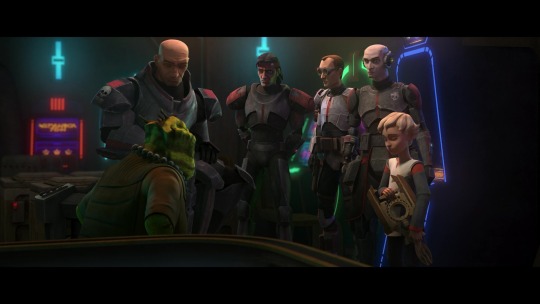
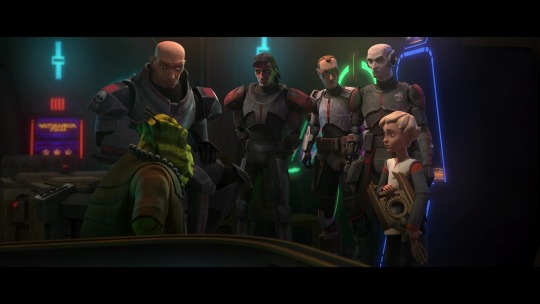
This is unsurprisingly one of my favorite moments he literally looks like he's going to explode when no one speaks up. IS NO ONE ELSE GOING TO TAKE THIS INCREDIBLY EASY QUESTION?
"You make money, I make money, and I watch your back." You fool. You will never get any money from these people.
CID WITH THE BOW IS HOT OKAY, I AM AN EASY MARK.
You know I'm surprised this facility doesn't sell the tactical droid modules themselves, like I'm sure it's imperial funded to get rid of all the separatist droids but come on, no one in the factory other than the Martez sisters is stealing these things?
BEING THE LOOKOUT WAS CROSSHAIR'S JOB. I'm sure Hunter loves getting that reminder of his Failure to keep his family together.
THE GIRLS ARE HERE <3
DON'T JUST STAND THERE. GRAB A WEAPON. "I had one >:T"
Omega was literally about to shoot Rafa at point blank range though like imagine her first kill was from about 2 feet away
SHOULD I HAVE LET THE DROID SHOOT YOU? Hunter has zero patience right now he is So Grouchy the instant Rafa opens her mouth
No worries just jump over the flaming pit of death Wrecker. Nothing bad can happen when you jump over the flaming pit of death.
LITERALLY STOLE THE DROID HEAD AND LEFT THE CHILD TRAPPED ON THE CONVEYOR BELT TO HELL.
God this moment with Wrecker's chip partially activating is so good.
Trace literally stops and realizes the child is going to be dumped into the slag and does NOTHING ABOUT IT FOR SO DAMN LONG. SHE COMES THROUGH IN THE END BUT GOD HOW LONG YOU GONNA STAND THERE?
I love them, they're disasters.
"Fine but I still don't like you." "I'M USED TO IT." This is very much like Hunter with Phee in season 2 he just gets so fucking cranky.
WRECKER HEARING "GOOD SOLDIERS FOLLOW ORDERS" IN CROSSHAIR'S VOICE IS SO FUCKING MUCH. Love this set up for next episode by which I mean I am horrified by it.
I'm easy, I find it hilarious when Echo makes a dad joke about their name.
THIS WILL HELP ME ACCESS THE PROGRAM. *TECH LITERALLY STABS THE DROID WITH SOME FORM OF SPIKE*
Honestly seeing Rafa again makes me remember those fake leaks when everyone was freaking the absolute fuck out over the idea that Rex/Rafa was going to be a thing in season 2 and honestly I still love the idea. I think that Rex falling for a garbage girl with thieving little raccoon hands is the funniest thing I've ever heard. He found a girlfriend in the dumpster.
Our first real push towards 'you can't just endlessly run away while doing it all for the money' from Trace. Again I am stuck on this, that you can't push for two seasons for the batch to actually stand up to the Empire and fight, to actually push back, and then have it turn out they should have just kept never getting involved anyway if they wanted to live. I'm chewing on the walls and the beams.
"in the end, we all choose sides" anyway this is why I think the very end of the show will be the batch together and actively choosing to go against the Empire, not because they're soldiers but because they're a family and they're fighting for each other. But unfortunately I don't think it will be as simple as retirement even if it's what they deserve, because of bits like this. At the very least, they're active in helping Rex get the other clones somewhere safe, even if they're not diving in to fight directly.
The way they hide who Rex is to make it look like the girls immediately turned on them doijsofd
SOON WE'RE GONNA HAVE REX THOUGH. THE BOY.
9 notes
·
View notes
Note
Tomorrow is Camilla's festival in honour of the woman who called Kate " a plastic princess designed for breeding"
Yep. Camilla will be celebrating the woman who wrote this in 2013. But then again Camilla had lunch with Jeremy Clarkson right after he wrote about wanting to hurl excrement at Meghan.
22 notes
·
View notes
Text
A few people tagged me in this a while ago and I found this in my drafts n thought it would be fun to do, BETTER LATE THAN NEVER RIGHT 😀 thank u @bouncehousedemons @adragonprinceswhore and @autumnhymns 💕
Nickname: Gee(sus Christ)
Sign: Capricorn sun, Scorpio moon, Pisces rising
Height: 5ft6
The last thing I googled: probably pornhub ngl
Amount of sleep: varies, my sleep is very broken at the moment
Dream job: actor/writer/gothic spinster
Favorite song: currently Sara by Fleetwood Mac
Movie/Book that Summarises Me: Normal People by Sally Rooney
Favorite instrument: Synth!!!!!! 🤩 High pitched noises make my brain happy
Aesthetic: In my head romanticism, old architecture, art galleries, forests, sunsets, pretty clouds, sad yearning. In reality, not nearly as classy as that, I'm more like the frazzled english woman aesthetic
Favorite authors: Neil Gaiman and Hilary Mantel
Random fun fact: I’m seeing Hozier on Friday!! With the guy who got me into Hozier and his new girlfriend yay 💀 it’s fine tho, Andrew’s deffo gonna see me somewhere in the crowd and fall in love with me sooooo 😌
9 notes
·
View notes
Photo

History is a set of skills rather than a narrative.
- Hilary Mantel
Growing up I was not a huge fan of the Tudor Age as I was of other historical ages such as the as Ancient Classical world or modern history. I don’t know why that was exactly. Perhaps it was the way history was taught at school. With the Tudor Age it was: divorced, beheaded, died; divorced, beheaded, survived. Those six words, resonanted with almost anyone who went to school in Britain, to become shorthand for the extraordinary story of Henry VIII and his six wives. But I credit Hilary Mantel for pulling me back into that crucial period in Britain’s history to what it is today. As much as the curmudgeonly Cambridge historian, David Starkey, was annoyed by historicital value of Hilary Mantel’s writings (claims made by her fans not her), it was she who led me to his historical works. And I love David Starkey.

The story of Henry VIII and his six wives is one of the most potent historical brands in our collective consciousness, but its combination of outrageous drama with intense familiarity means it can morph all too easily into soap opera.
It almost felt there was nothing new to say about the period. And, for a long time, there wasn’t. Then, in 2009, Hilary Mantel published Wolf Hall, the first volume of a trilogy set in the 1500s. But instead of treading well-worn ground – Henry VIII’s shenanigans and the sad yet ultimately one-dimensional stories of his six spouses – Mantel offered something new: an intricate look at the extraordinary rise of Thomas Cromwell, from boy soldier to one of Henry’s most trusted advisors.
Hilary Mantel had this ability to get deep within the minds of her subjects, capturing the essence of a voice in a way that somehow profoundly intertwined a character with you as you read. And really, she wasn’t writing about royalty in the way that other historical fiction authors had in the past: she was writing about the people behind the figureheads, the power struggles, the calculations of history, grief, love, anger, revenge – all themes that resonate throughout the ages. She wrote with feeling, but also with a precision, clarity, and wit that was unparalleled.
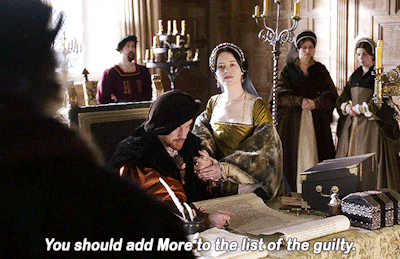
It’s worth recalling that, before Mantel, Thomas Cromwell barely inhabited the public imagination: if recognised at all, he was often conflated with his distant descendant Oliver Cromwell. Today, he has supplanted in our imagination that “man for all seasons” Thomas More, in whose conviction and execution for treason Cromwell himself played a key role.
Mantel said that, before she wrote Wolf Hall, Thomas Cromwell was “under-imagined”. She’s entirely right but, strangely, I think the same has also been true of the period’s marquee names. Because we know in advance exactly how the plot will unfold, we tend to overlook its strangeness, its horror, its unpredictability, its astonishing complexity. Hilary Mantel changed all that.
Readers and critics alike found Mantel’s approach an original and welcome addition to Tudor fiction, as it offered something genuinely different and unfamiliar. Historian Thomas Penn, author of Winter King: The Dawn of Tudor England, says that while ‘the Tudors have always been box-office… Hilary Mantel’s novels have allowed people to imagine them in a new light’.
Mantel had a lyrical sense of the irreducible strangeness of the world, with its vivid moments of beauty and threat, but this was never removed from her understanding of the moral imperatives of our shared responsibilities. She was never a neutral observer of the ebb and flow of history.

It is striking that in the many well deserved obituaries of Hilary Mantel they all pay tribute to her ability to transport the reader to another time, but they often fail to appreciate that Mantel never treated history as a set. Rather, the past in her novels is alive, a place with real implications for the present. What I mean to say is that Mantel approached her subjects not only as a novelist, but also as a historian - demanding of the past not merely scenery but also meaning, an argument, something that might help us explain who we are today.
The trilogy composed of Wolf Hall (2009), Bring Up the Bodies (2012), and The Mirror and the Light (2020) concerns Thomas Cromwell, Henry VIII’s chief advisor from the early 1530s until his execution in 1540. He was also the great-great-granduncle of Oliver Cromwell. For a long time, historians thought of Cromwell as a goon, Henry’s henchman who battered down the doors of English monasteries and engineered executions of the king’s enemies (until he himself fell beneath the axe).
But in later works of history, especially those by the doyenne of Tudor period history, the historian Sir Geoffrey Elton, Thomas Cromwell came to be seen as a more sophisticated operator, someone who fundamentally rethought the English monarchy and, in a certain sense, invented the modern state with all its peculiarities. When Henry wanted a divorce from his first wife, the Spanish princess Catherine of Aragon, his chief minister Cardinal Thomas Wolsey, at the time Cromwell’s patron, could not provide it. Cromwell could. Working through parliament, he severed England’s ties to the Vatican and, a firm proponent of the Reformation, set about creating a Protestant Church of England under the monarch. In so doing he affirmed royal supremacy in government while building new bureaucracies to oversee the Church and the revenues it brought to state coffers. Here, goes the argument, are the origins of our modern state, in Henry’s need for an heir and Cromwell’s desire to reform the Church.
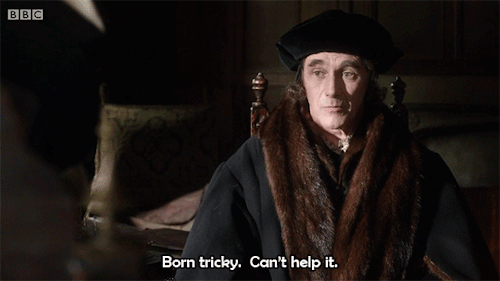
This is the argument of Mantel’s trilogy, too. Following the course of Cromwell’s life, she gives us a shoulder perch to his rise from blacksmith’s son to European mercenary to lawyer to member of the privy council to, briefly, Earl of Essex. He’s a commoner, though, which the lords and ladies of court never once let him forget. His use to the king must be distinctive, then: his command of numbers, his talent for getting people to do what Henry wants. And, yes, his willingness to plunder the riches of the Church - its fattened abbeys and monasteries - to keep the state solvent.
Sinister is one word for Cromwell. Mantel doesn’t deny it. While he needs the Boleyns to force the break with Rome, he is happy to later take revenge against them for their role in Wolsey’s downfall. Of Anne, he thinks to himself, “If need be, I can separate you from history.” With an equal coolness, he soon separates her from her head. There’s something positively Hegelian about Cromwell’s perspective. Indeed, the philosopher once wrote of how great men of history “fall off like empty hulls from the kernel” after “their objective is attained.”
But Mantel is not Hegel. It doesn’t do justice to her empathy. It’s not only that she is arguing that the modern state emerged from the Tudor court, it is also that it emerged from the very particular constellation of individuals and their peculiar desires. It’s one thing to say Cromwell invented the modern state by codifying England’s territorial sovereignty, rationalising government through bureaucracy, and elevating parliament’s legislative role. It’s another to understand his grief at Wolsey’s demise, to comprehend his rage against the Boleyns, to feel his anxiety that if he cannot satisfy Henry’s whims, he may be next on the scaffold. Mantel has a deep sense of the past, the ability “to feel history through your skin,” as she once put it.
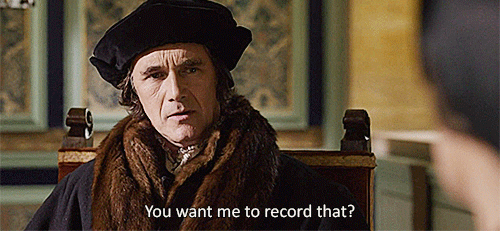
Thus, we care about Thomas Cromwell and what happens to him not only because Mantel portrays him in such vivid detail, but also because we sense the world-historical purpose he drags behind him. We sense that there is a reason to his actions that continue to shape the world we inhabit today. And after decades of neoliberal reforms that have lopped off the wings of the state, we have need today for figures like Thomas Cromwell who perceived in the state its vast human potential.
This is what the best historians do. It’s a way of thinking about the past that Walter Benjamin described, while on the run from the Nazis, in ‘Theses on the Philosophy of History’ (1940). Today, some still consider history to be nothing more than the dry recitation of facts - “telling the sequence of events like the beads of a rosary,” in his withering formulation. Benjamin instead advocated for a kind of historical writing that would “blast open the continuum of history,” one that would put the present in “constellation” with earlier eras in the knowledge that “even the dead will not be safe.” It’s writing history with fire. I can agree with the spirit if not quite the practice. But so often those who try it do it with clumsily and with ideological baggage. Mantel painted her prose with a light brush.

Hilary Mantel’s genius was that she knew instinctively where a historian couldn’t go, and consequently where she, as a novelist, could. This is just one of the reasons why she was able to summon up a fully realised world, and why the Wolf Hall trilogy is one of the great fictional achievements of our modern age.
#mantel#hilary mantel#wolf hall#thomas cromwell#tudor age#henry VIII#history#tudor period#literature#author#writer#books#reading#british history#british#icon#culture#arts
68 notes
·
View notes
Text
31DOD Day 22
Robin!Dick mini or Dick!Bats mini?
I'm assuming this is what I would prefer to read, so that is what I'm going to write about!
I would love to see a Dick!Bats mini! I thought his era as Batman was kind of short lived compared to other characters that took up the mantels of their mentors. There have been multiple moments where Dick was shown as being better at being Batman than Bruce. There was also plots that were left open when DC nuked their comics and started the New 52. I think a mini would be an awesome opportunity to revisit some of this stuff especially now that "everything is canon" after Infinite Frontier #0 came out.
Dick, Steph, and Damian had such an interesting dynamic as Batman, Batgirl, and Robin. I would love to see these three interact again in this format (DC is doing steph and damian so dirty).
Gotham seemed so much grittier during Dick's Batman era than it does right now. Dick's Batman was very much about solving complicated mysteries and secret societies. I love secret societies in combo with Dick. He's like catnip for them its funny. (The number of cults he's involved with is hilarious).
#31dod#dick grayson#nightwing#robin#batman#dick!bats#bruce wayne#damian wayne#damian al ghul#stephanie brown#spoiler#batgirl#batfam#dc#my stuff
41 notes
·
View notes